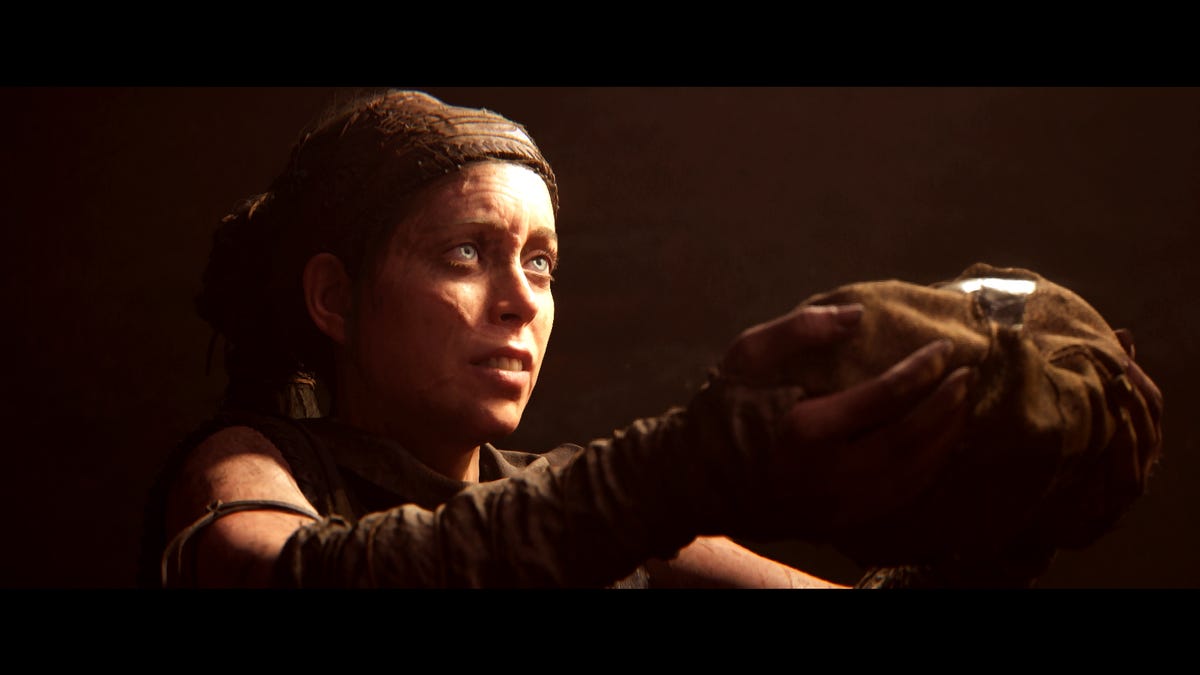Narrative action-adventure game Senua’s Saga: Hellblade II arrived on PC and Xbox on May 21, 2024. It features a focused story covering a wide variety of emotional and societal themes that are fascinating to turn over in your mind.
Read More: Senua’s Saga: Hellblade II: The Kotaku Review
The challenge, to me, of Senua’s Saga isn’t so much succeeding in its puzzles or combat (though the combat can be fun), but is rather found in understanding the ebb and flow of Senua’s trip through Iceland and the people she meets. The density of its text and dialogue is what’s waiting for you to unpack, not skill trees and reaction-based timing challenges.
And given its relatively short runtime compared to other games, that makes it perfect for multiple playthroughs to revisit key moments, or come to understand the significance of how the game begins and ends, and what exactly the challenges are that Senua must overcome in this new chapter.
The bonus narration is reason enough to play Hellblade II multiple times
After you reach the end of Senua’s…um, saga, you will unlock narration from “The Others,” the three NPCs who accompany Senua on her journey. They’ll narrate sections of the game based on which chapters you’re in, starting with Viking slaver, Thorgestr.
Read More: Hellblade II Tips For Mastering The Game’s Visceral Combat
Hellblade II is a game about many things, but it’s especially about the characters Senua meets (with Thorgestr, perhaps, being the most changed by his journey with Senua). Getting insight into how these characters see Senua and their world is a really great way to understand the different nuances and emotional contours of this game.
Astridr, the solitary and fiercely protective leader Senua encounters in the Bardarvik chapter, for example, talks a bit about her family in a way that helps shine more of a light on who she is. Of course she does talk to Senua a bit about her life before things took a turn for the worse, but hearing it from her directly through narration fleshes her story out even more.
As I’ve been playing with the “Others” narration on (which you can either choose at the start of a new game or at any time in the game’s audio settings following completion of the narrative), I’ve almost come to wonder if this is the way Senua’s Saga ought to have been. True, the main narrator establishes a nice sense of cohesion with the first game, but given how much the Furies—the voices Senua hears in her mind—add to the regular gameplay, and essentially narrate and comment on what’s going on, hearing other characters really makes the experience a little more narratively dynamic.
Read More: How To Make The Most Of Hellblade II’s Graphics On PC
Also, if you discover all of the “loresingr” unlockables, you’ll unlock Druth, Senua’s spiritual companion from 2017’s Senua’s Sacrifice.

Senua’s Saga is a dense narrative that becomes more clear the second time through
A lot happens in Senua’s Saga. And upon my second playthrough, particularly during the opening brawl with Thorgestr, I was struck by what Senua sees in him and eventually decides to do following the fight—especially the similarities between how this fight ends and how the final boss fight of the game concludes. Flash forward to the walk to Freyslaug, and there were lines that stood out to me more this time around. Here’s one in particular:
Thorgestr: Do you see these graves? This is how we honor our dead. There will be no one to bury you.
Senua: You haven’t honored these graves. What happened?
Thorgestr: I told you…Draugar. They won’t just kill you. It is far worse. It is what they do after. They…You still have a chance to save your life if you stop now.
Senua: Is it my life you’re trying to save?
This exchange happens after Thorgestr says how much he wishes Senua would’ve drowned when the ships crashed and how he plans to kill her after he gets free from her. Yet, here she is highlighting the fact that there is some part of him that is concerned for her own safety, speaking to his humanity that is buried under his blind devotion to his father and myopic perspectives.
Read More: Hellblade 2 Studio Reportedly Already Working On Its Next Game
So much of Senua’s Saga is about changes in perspective, different ways of seeing “reality,” that a line like this, given where the story goes, bears so much weight. There are many other examples like this in Saga that, for me anyway, become more apparent upon a second playthrough.
If you haven’t already, consider using subtitles on subsequent playthroughs
On my second playthrough, I’ve found subtitles to be a pretty effective way of focusing on what individual characters say to one another. Senua’s “Furies” interject constantly, which does get distracting.I think that’s the point, but having actual lines of dialogue to read (the Furies’ lines are displayed on the appropriate sides of the screen to emulate the experience of hearing them on either side of you) can help you focus a bit on exchanges like the one highlighted above.
Senua’s Saga is a journey of complex emotions and events, many of which take on new tones and meaning upon revisiting. Whether you’re up for playing Hellblade II again immediately after hitting the credits, or after letting it exist in your mind for a while, the second time around is certainly worth the effort if you’re looking to soak up all that this game has to offer.
.

